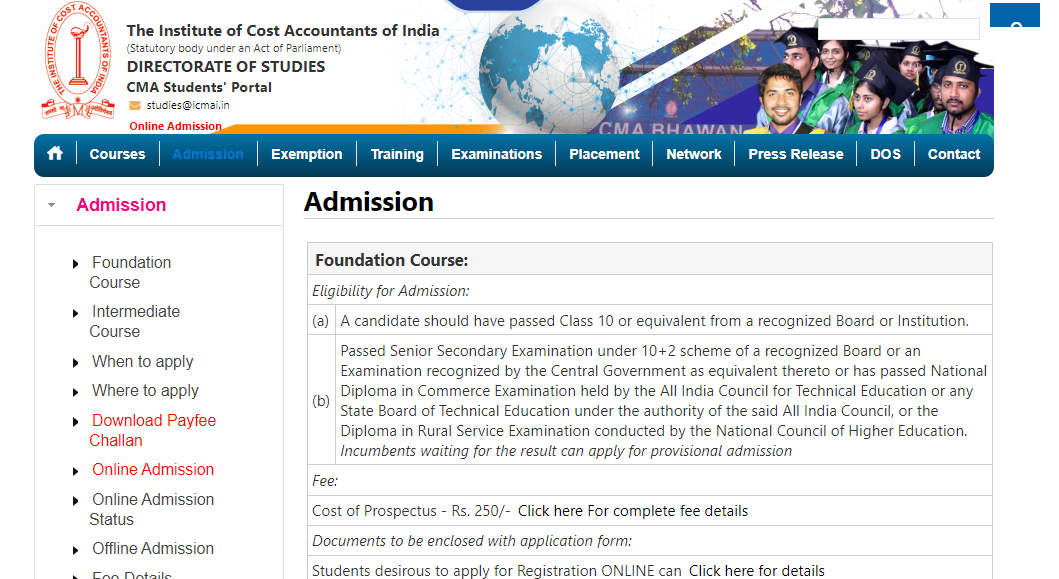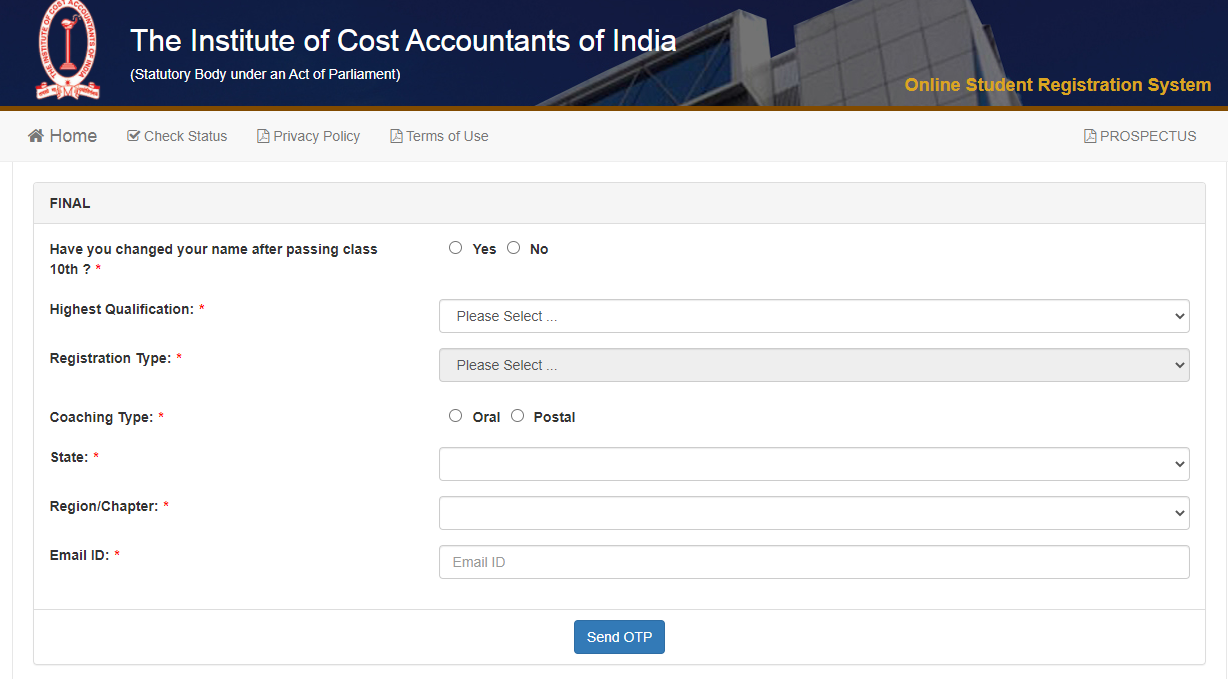Symbiosis Online Programs
Online PG programs from Symbiosis Centre for Distance Learning
The Institute of Cost Accountants of India (ICMAI) will close the CMA Final June 2026 registration window on February 10, 2026. The registration fee is Rs. 25,000 and can be paid via postal/online modes. The CMA Final June 2026 exam dates will be notified soon. Eligible candidates willing to appear in the June 2026 exams should register for the CMA Final 2026 exam before the last date. After checking the CMA Final eligibility criteria, candidates can register online as well as offline. CMA Final exam is conducted twice in a year - once in June and next in December.
This Story also Contains

| Events | Dates |
|---|---|
CMA Final registration 2026 begins | Open |
CMA Final registration closes |
|
Last date to fill CMA Final June 2026 exam form | Will be notified |
Release of CMA Final admit card | Will be notified |
CMA Final June 2026 exam date | Will be notified |
The Institute of Cost Accountants of India (ICMAI) prescribes the eligibility criteria for CMA Final exam on its official website. To register for the CMA final exam 2026, candidates should fulfill the following conditions-
should have qualified the CMA Intermediate exam in the penultimate term (those who have passed CMA Inter in December will not be allowed to sit for CMA Final December)
should have a valid registration number
Should have completed prescribed training of the CMA Final course
Should not be debarred from appearing in CMA Final course examination
Although the CMA Final registration remains open throughout the year, candidates need to keep in mind the registration cutoff dates before applying. Tabulated below are the CMA Final registration 2026 cutoff dates which are prescribed by ICMAI
| For June term examination | January 31 of the same calendar year |
For December term examination | July 31 of the same calendar year |
Any of the two modes can be selected by candidates-
Online
Postal
At the time of ICMAI final registration, candidates have to make payment as per the following table-
Oral | Postal | ||
|---|---|---|---|
Option I (Without installment) | Option II (With Installment) | Option I (Without installment) | Option II (With Installment) |
Rs. 25000 | Rs. 15000 Rs. 10000 | Rs. 25000 | Rs. 15000 Rs. 10000 |
S. No. | Documents | Size |
|---|---|---|
1 | Candidate’s Passport Photo | JPG/JPEG | 200 KB |
2 | Age proof document | PDF | 300 KB |
3 | CMA-Inter Mark Sheet - Both Groups | PDF | 300 KB |
4 | Specimen signature | JPG/JPEG | 100 KB |
Candidates can follow the given steps to register for CMA Final 2026 exams-
Step 1 - Visit the official website of ICMAI - icmai.in. Now click on the tab “Students” visible on the menu bar as shown in the image below.

Step 2 - You will be redirected to the students website of ICMAI. Proceed to fill the CMA Final application form 2025 by clicking on the link “Admission” as shown in the given image.

Step 3 - On the admission page, click on the option of “Online admission” given on the left side of the page in red font.

Step 4 - You will be redirected to a similar page as shown in the image below. Now click on the link “Apply for Final Course” to proceed forward and fill the application form.
Step 5 - Enter the required details (highest qualification, registration type, coaching type, email ID etc.) and generate OTP to get login details.

Step 6 - Login with the CMA Final login credentials sent to you by ICMAI. Proceed to fill the CMA Final 2026 application form. Enter all necessary details such as your name, parent’s name, address details, date of birth, gender, qualification details, etc. Verify the filled information and click on the tab ‘Save and Next’ as shown below.
Step 7 - Upload the scanned documents - Once done with all above steps, upload the required documents as specified by ICMAI.
Step 8 - Once done with filling the details, complete the CMA Final 2026 registration process by making the payment. The fees is to be paid according to the coaching type (oral or postal) selected. A confirmation receipt will be generated on screen after the payment is processed. Candidates should keep a copy of the receipt for future reference.
Note- Application forms can be left incomplete for 30 days. After this, candidates have to make a fresh application request.
CMA Final Registration Validity
Once registered, the CMA registration validity lasts for a period of 7 years. Candidates can clear both Group 3 and Group 4 of the CMA Final exam within 7 years. Post this period, it can be revalidated.
Also, check - CMA Final Exam Pattern 2026
After the completion of the registration process for June session, ICMAI will release the CMA Final exam form for the CMA Final June 2026 session. Candidates who want to appear in the session will be required to fill the CMA Final exam form 2026. Candidates failing to submit the CMA Final exam form (June) will not be allowed to appear in the exams for that particular session.
Registered candidates can plan their preparation strategies by going through the official CMA Final study material 2026. To check the major topics and sub topics covered in the exam - check CMA Final syllabus 2026.
Once the CMA Final exam application forms are open now, the CMA Final admit card will be issued by ICMAI in online mode. ICMAI will release the admit card of CMA final exam for the June 2026 session. Candidates registered for the exam should mandatorily download and carry the CMA Final admit card to their allotted exam centres. Candidates without a hard copy of admit card will not be allowed to appear for the exam.
Also, check -
Frequently Asked Questions (FAQs)
Registration for the CMA Final June 2026 exams is open till January 31, 2026.
Yes, candidates who want to appear in the CMA exams should compulsorily fill the exam form within the prescribed time.
Candidates can select from any of the two following coaching options-
Postal
Online
The registration fee for both oral/ postal modes is Rs. 25000.
On Question asked by student community
Hi,
Yes the final CMA syllabus is expected to change a little for the June 2022 session. The syllabus is updated every 5 years although the changes are not very drastic. As the years go by, some chapters become obsolete and some new chapters need to be include. Thus the
NAAC A++ Accredited | Ranked #11 by NIRF
Among top 100 Universities Globally in the Times Higher Education (THE) Interdisciplinary Science Rankings 2026
MSc Finance and MSc International Management Admissions 2026 Now Open | Ranked Among the Top 100 Universities in the World by QS World University Rankings 2025 | Early Round 2 Applications Deadline: 29th Jan’26
Achieve gold standard in accounting & get recognized globally
Highest CTC 58 LPA | Avg CTC 11.35 LPA| 150+ Recruiters
Be a part of the largest Cost & Management Accounting Body